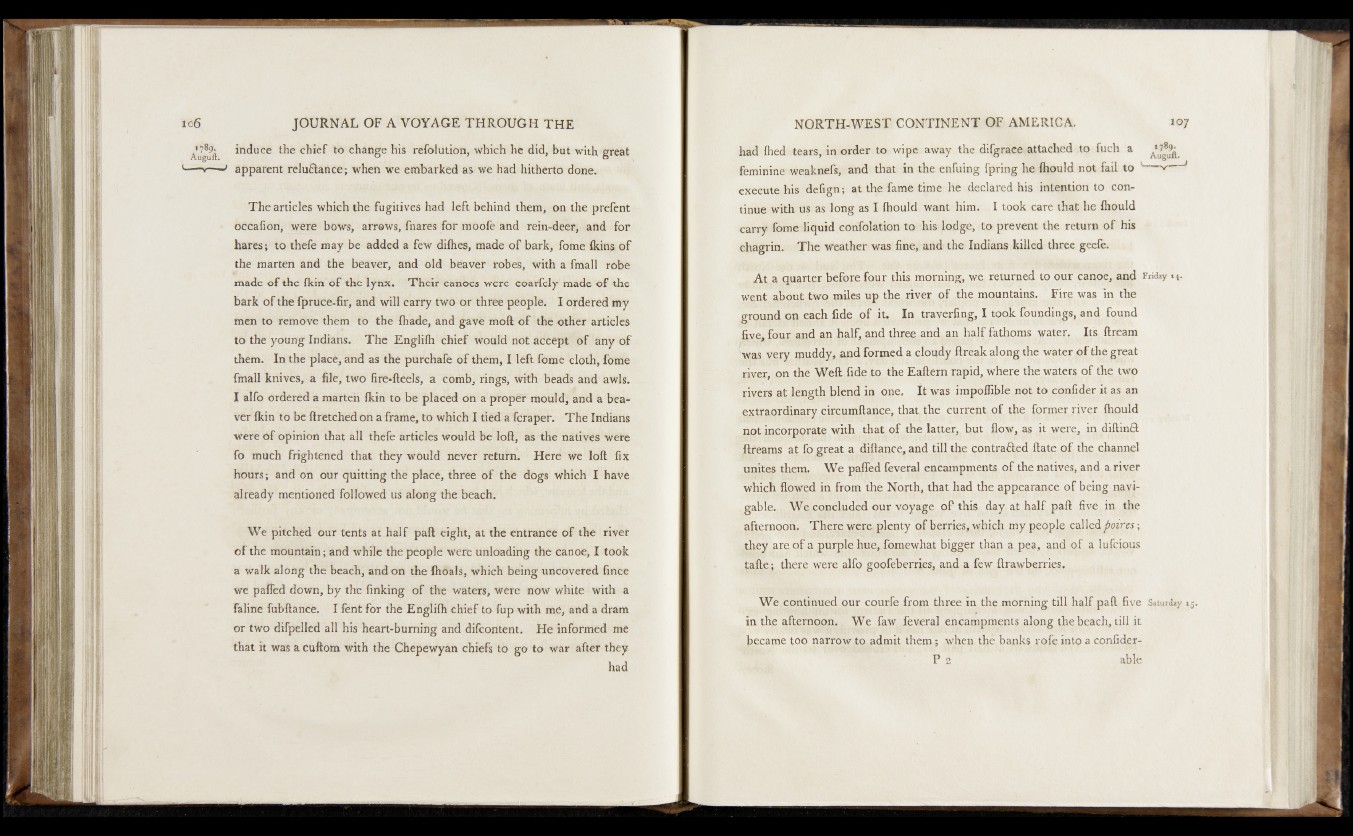
J$l|
Augurt. had fhed: team, in order to wipe away the difgraeevattached to fuch a
induce the chief to change his refoiution, which he did, but with great
apparent relu£tance; when we embarked as we had hitherto done.
The articles which the fugitives had left behind them, on the prelent
öCCafiön, were bows, arrows, fnares for möofe and rein-deer, and for
hares; to thefe may be added a few difhes, made of bark, fotne fkins of
the marten and the beaver, and old beaver robes, with a final I robe
made o f the fkin of the lynx. Their canoes were coarfely made of the
bark of the fpruce-fir, and will carry two or three people. I ordered my
men to remove them fO the fhade, and gave moft of the other articles
to the young Indians. The Englifh chief would not accept Of any of
them. In the place, and as the purchafè of them, I left fome cloth, fome
fmall knives, a file, two fire-fteels, a comb, rings, with beads and awls.
I alfo ordered a marten fkin to be placed on a proper mould, and a bea*
Ver fkin to be flretched on a frame, to which I tied a fcraper. The Indians
were o f opinion that k» thefe articles would be loft, as the natives were
fb much frightened that they would never return. Here we loft fix
hours; and on our quitting the place, three of the dogs which I have
already mentioned followed us along the beach.
We pitched our tents at half paft eight, at the entrance of the rivet
of the mountain; and while the people were unloading the canoe, I took
a walk along the beach, and on the fhöals, which being uncovered fince
we palled down, by the finking of the waters, were now white with a
faline Fubftance. I lent for the Englifh chief to fop with me, and a dram
or two dirpelled all his heart-burning and difcontent. He informed me
that it was a cuftom with the Chepewyan chiefs to go to war after they
had
feminm^i weaknefsj- and that in the enfutng fpring he fltould not fail to ' -v- 1
e x e cu te his defign; at the fame time he declared his intention to continu
e with' us: as long as I fhould want him. I took care that he (hould
carry fome liquid confolation to his lodge, to prevent the return of his
chagrin. The weather was fine, and the Indians killed three geefe.
At a quarter befoye four this, morning, we returned to our canoe, and Friday 14.
\Vjgnt about tyro n>fles up tfie river pf the mountains. Fir^ was In the
ground op each fide of it. In^traverfing, I took foundings, andfc found
five, four and an fialf^ and three^and^ an half fathoms yater. Its ftream
w?s very pmddy/and formed a eloudy ftreak along the water o f the great
river^on the Weft fidefto the Eaftern rapid, where the waters of the. twp
rivers at length blend in one. It was impoffihle not to cpnfider it as an
e^traordinary circumftance, that, the current of the, former river fhould
npt incorporate with that of the latter, but flow, as it were, in diftinft
ftreams at fp great a diftance, and till the contracted ftate of the channel
unites them. We paffed feveral encampments of the nativqs4 and a river
which flowed in, from the North, that had the appearance of being navj-
. gable.,^ We concluded our voyage o f this day at.fialf paft five , jn the
afternoon,. There were,plenty of berries, yjfnch my people called tioixes;
they are o f a purple hue, fomewhat bigger than a pea, and of a Iufcious
{afte; there were alfo goofeberrjps^ and p foy?; ftrawbepries.
We.continued pur cquriTe fforo three in th$ njorning. till half paft five Saturday»
in the afternopn. We law ,feveral encampments along the beach, till it
became too narrow .to admit them; ydxen the banks r^fo into a cqpfider-
P 2 able